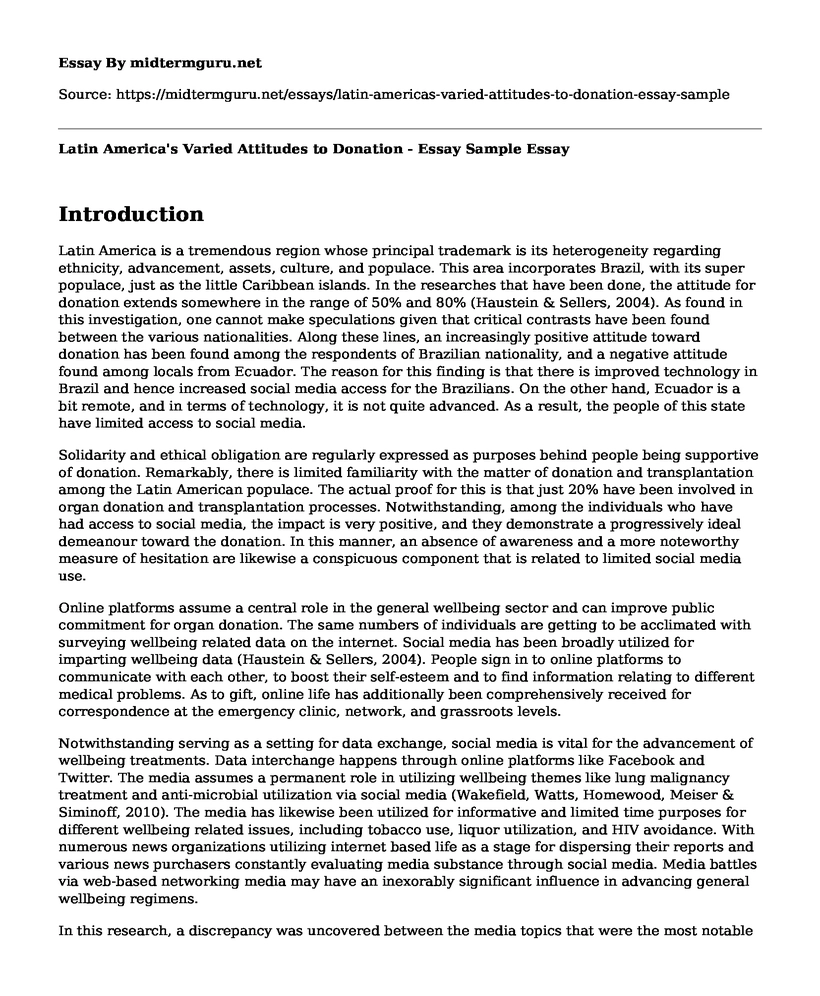Introduction
Latin America is a tremendous region whose principal trademark is its heterogeneity regarding ethnicity, advancement, assets, culture, and populace. This area incorporates Brazil, with its super populace, just as the little Caribbean islands. In the researches that have been done, the attitude for donation extends somewhere in the range of 50% and 80% (Haustein & Sellers, 2004). As found in this investigation, one cannot make speculations given that critical contrasts have been found between the various nationalities. Along these lines, an increasingly positive attitude toward donation has been found among the respondents of Brazilian nationality, and a negative attitude found among locals from Ecuador. The reason for this finding is that there is improved technology in Brazil and hence increased social media access for the Brazilians. On the other hand, Ecuador is a bit remote, and in terms of technology, it is not quite advanced. As a result, the people of this state have limited access to social media.
Solidarity and ethical obligation are regularly expressed as purposes behind people being supportive of donation. Remarkably, there is limited familiarity with the matter of donation and transplantation among the Latin American populace. The actual proof for this is that just 20% have been involved in organ donation and transplantation processes. Notwithstanding, among the individuals who have had access to social media, the impact is very positive, and they demonstrate a progressively ideal demeanour toward the donation. In this manner, an absence of awareness and a more noteworthy measure of hesitation are likewise a conspicuous component that is related to limited social media use.
Online platforms assume a central role in the general wellbeing sector and can improve public commitment for organ donation. The same numbers of individuals are getting to be acclimated with surveying wellbeing related data on the internet. Social media has been broadly utilized for imparting wellbeing data (Haustein & Sellers, 2004). People sign in to online platforms to communicate with each other, to boost their self-esteem and to find information relating to different medical problems. As to gift, online life has additionally been comprehensively received for correspondence at the emergency clinic, network, and grassroots levels.
Notwithstanding serving as a setting for data exchange, social media is vital for the advancement of wellbeing treatments. Data interchange happens through online platforms like Facebook and Twitter. The media assumes a permanent role in utilizing wellbeing themes like lung malignancy treatment and anti-microbial utilization via social media (Wakefield, Watts, Homewood, Meiser & Siminoff, 2010). The media has likewise been utilized for informative and limited time purposes for different wellbeing related issues, including tobacco use, liquor utilization, and HIV avoidance. With numerous news organizations utilizing internet based life as a stage for dispersing their reports and various news purchasers constantly evaluating media substance through social media. Media battles via web-based networking media may have an inexorably significant influence in advancing general wellbeing regimens.
In this research, a discrepancy was uncovered between the media topics that were the most notable on the media motivation and those that were the best in expanding organ gift mindfulness and expectations via web-based networking media. These discoveries give direction to crusades on organ gift. The outcomes additionally recommend the capability of campaigns via web-based networking media for advancing prosocial wellbeing practices and feature the significance of fundamental message structure for serving this objective. More education ought to be made on social media and other platforms so that the attitudes that people have toward organ donation can be positive. This way, many lives can be saved. The healthcare systems also need to be improved to incorporate community education programs that will enlighten people on the benefits of organ donation and transplantation.
References
Haustein, S. V., & Sellers, M. T. (2004). Factors associated with (un) willingness to be an organ donor: the importance of public exposure and knowledge. Clinical transplantation, 18(2), 193-200. https://doi.org/10.1046/j.1399-0012.2003.00155.x
Wakefield, C. E., Watts, K. J., Homewood, J., Meiser, B., & Siminoff, L. A. (2010). Attitudes toward organ donation and donor behaviour: a review of the international literature. Progress in Transplantation, 20(4), 380-391. https://doi.org/10.1177/152692481002000412
Cite this page
Latin America's Varied Attitudes to Donation - Essay Sample. (2023, Feb 07). Retrieved from https://midtermguru.com/essays/latin-americas-varied-attitudes-to-donation-essay-sample
If you are the original author of this essay and no longer wish to have it published on the midtermguru.com website, please click below to request its removal:
- Issues Affecting Healthcare Demand Services - Paper Example
- Reading Comprehension Assignment on Hiren Mistrys Essay About Multiculturalism in Canadian Schools
- Article Analysis Essay on Shooting in The Dark
- Paper Example on America's Scar of Racism
- Drug Abuse: A Global Crisis Connected to Crime - Research Paper
- Achieving Gender Equality: Challenges & Progress Across the Globe - Essay Sample
- U.S. Immigration: Assimilation, Culture, and Economics - Essay Sample







